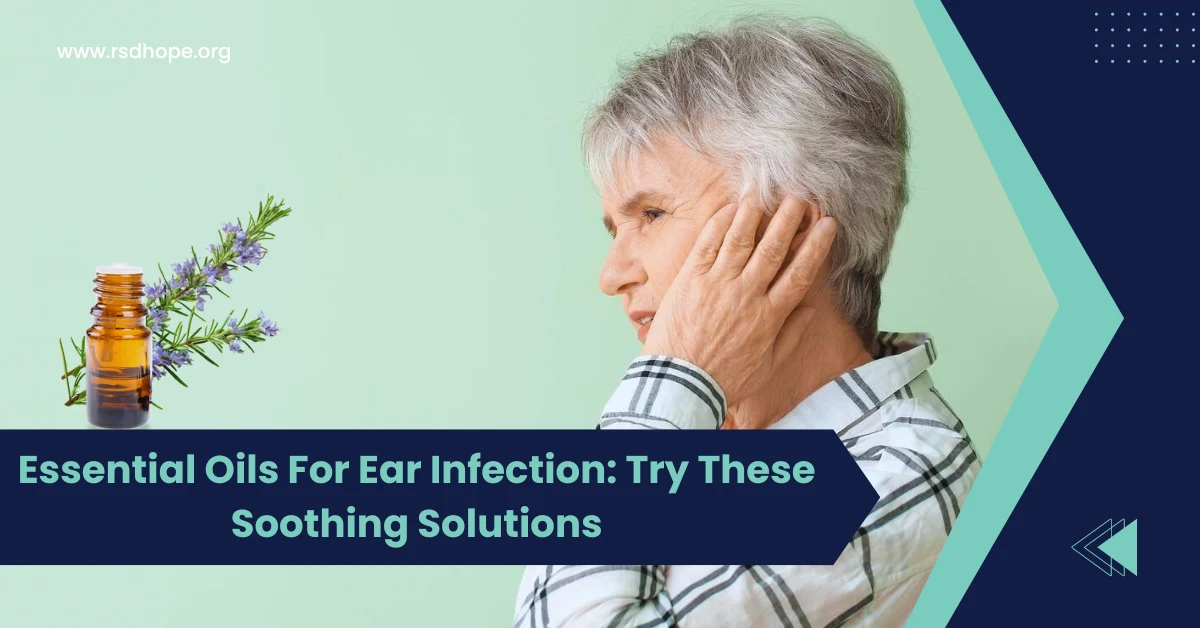Ear infections can be painful and uncomfortable, affecting both children and adults alike. While traditional treatments like antibiotics are often prescribed, many people are turning to natural alternatives like essential oils for relief.
In this guide, we’ll explore the best essential oils for ear infections, how to use them safely, and their effectiveness in providing comfort and support during the healing process.
Key Takeaways
- Essential oils such as tea tree, lavender, and chamomile have antimicrobial and anti-inflammatory properties that can help combat ear infections.
- Proper dilution and application techniques are crucial for the safe use of essential oils in treating ear infections.
- While essential oils can provide relief, it’s essential to consult a healthcare professional for severe or recurring ear infections.
Understanding Ear Infection
An ear infection occurs when the middle or outer ear becomes inflamed or infected, often due to bacteria or viruses. Common symptoms include ear pain, fever, difficulty hearing, and fluid drainage from the ear.
According to the National Institute on Deafness and Other Communication Disorders (NIDCD), five out of six children will have at least one ear infection by their third birthday. While most ear infections resolve on their own, severe or recurring cases may require medical intervention.
Best Essential Oils for Ear Infection
Several essential oils have properties that can help alleviate the symptoms of ear infections. Some of the most effective options include:
- Tea Tree Oil: Known for its potent antimicrobial properties, tea tree oil can help fight the bacteria or fungi that cause ear infections.
- Lavender Oil: With its anti-inflammatory and analgesic effects, lavender oil can help reduce pain and swelling associated with ear infections.
- Chamomile Oil: Chamomile oil has soothing properties that can help calm irritation and inflammation in the ear canal.
When purchasing essential oils for ear infections, look for high-quality, pure oils from reputable brands to ensure safety and effectiveness.
How to Use Essential Oils for Ear Infection?
There are several ways to use essential oils for ear infections, but it’s crucial to follow proper dilution and application techniques to avoid irritation or further complications. One safe method is to mix a few drops of essential oil with a carrier oil like coconut or olive oil and apply it gently around the outside of the ear, avoiding the inner ear canal. You can also diffuse essential oils in the air to promote relaxation and support overall healing.
When using essential oils on children or individuals with sensitive skin, always perform a patch test and use a higher dilution ratio to minimize the risk of adverse reactions. The National Association for Holistic Aromatherapy (NAHA) recommends using a 0.5-1% dilution for children and sensitive individuals.
How Do Essential Oils Work for Ear Infections?
Essential oils contain various compounds that have antimicrobial, anti-inflammatory, and analgesic properties. These properties can help combat the bacteria or viruses responsible for ear infections, reduce pain and swelling, and promote healing.
A study published in the Journal of Laryngology & Otology found that a blend of tea tree, lavender, and chamomile oils was effective in reducing ear pain and inflammation in children with acute otitis media.
Are Essential Oils Safe to Use for Ear Infections?
While essential oils can be a safe and natural approach to treating ear infections, it’s essential to use them correctly and under the guidance of a healthcare professional. Improper use or application of essential oils can lead to skin irritation, allergic reactions, or even exacerbate the infection. Always dilute essential oils with a carrier oil, perform a patch test before use, and consult your doctor if symptoms persist or worsen.
Conclusion
Essential oils offer a natural and holistic approach to relieving the symptoms of ear infections. By understanding the properties of different essential oils, proper application techniques, and safety precautions, you can incorporate these powerful plant extracts into your ear infection treatment plan. Remember to consult with a healthcare provider for severe or recurring infections and to ensure the safe and effective use of essential oils for your individual needs.
FAQs
A: While essential oils can provide relief and support healing, they should not be considered the sole treatment for ear infections. Always consult a healthcare professional for proper diagnosis and treatment.
A: The frequency of application may vary depending on the severity of the infection and the individual’s response. Generally, applying diluted essential oils around the ear 2-3 times daily is considered safe. However, consult your healthcare provider for personalized guidance.
A: No, it’s not recommended to apply essential oils directly into the ear canal, as this can cause irritation or damage to the delicate tissues. Instead, apply diluted essential oils around the outside of the ear and along the lymph nodes on the side of the neck.
A: Some essential oils, such as cinnamon or thyme, can be highly irritating and should be avoided for use on the delicate skin around the ear. Always research the properties and safety precautions of each essential oil before use and consult with a qualified aromatherapist or healthcare provider if you have concerns.
References:
Ear Infection (Otitis Media) – https://my.clevelandclinic.org/health/diseases/8613-ear-infection-otitis-media

